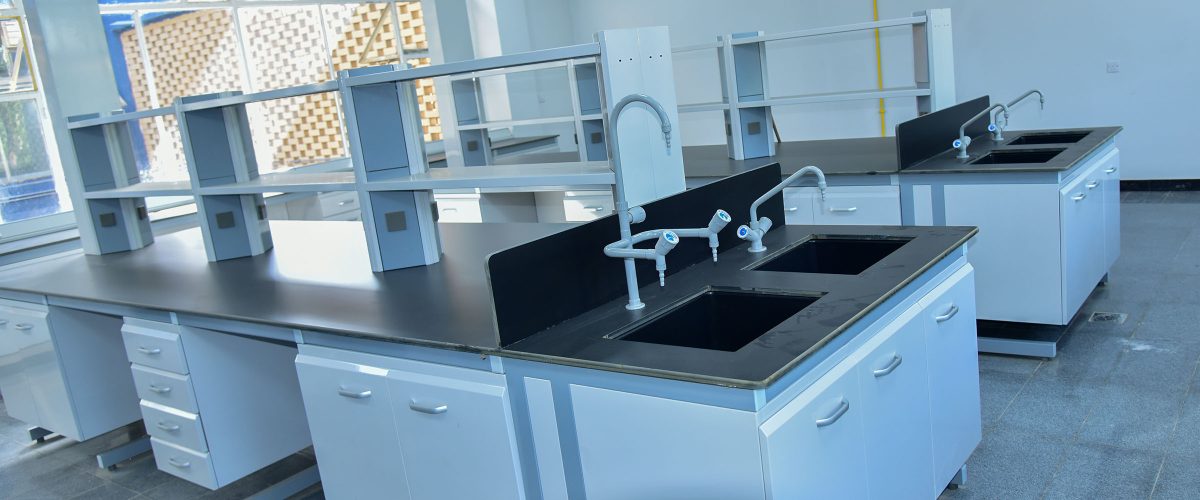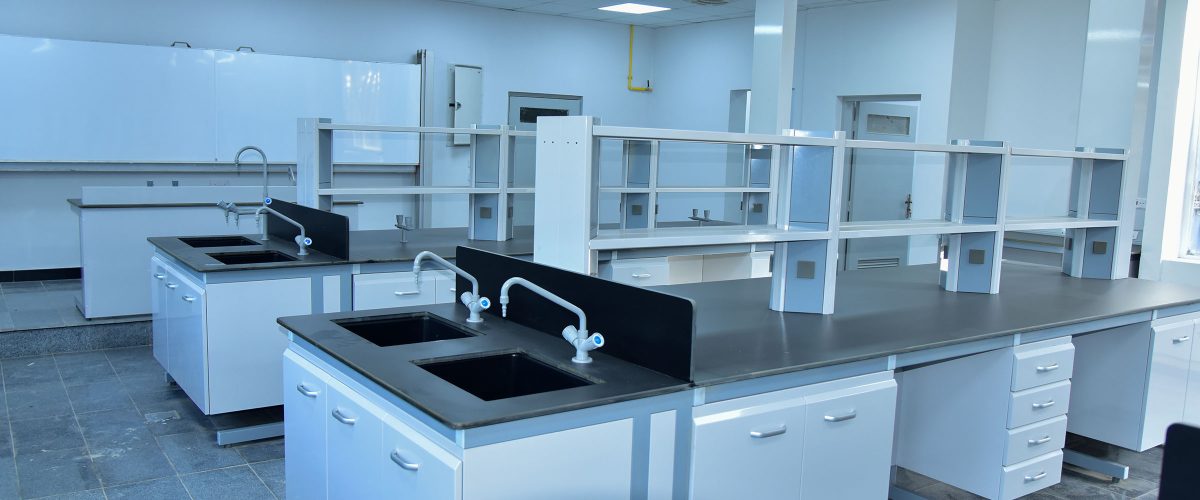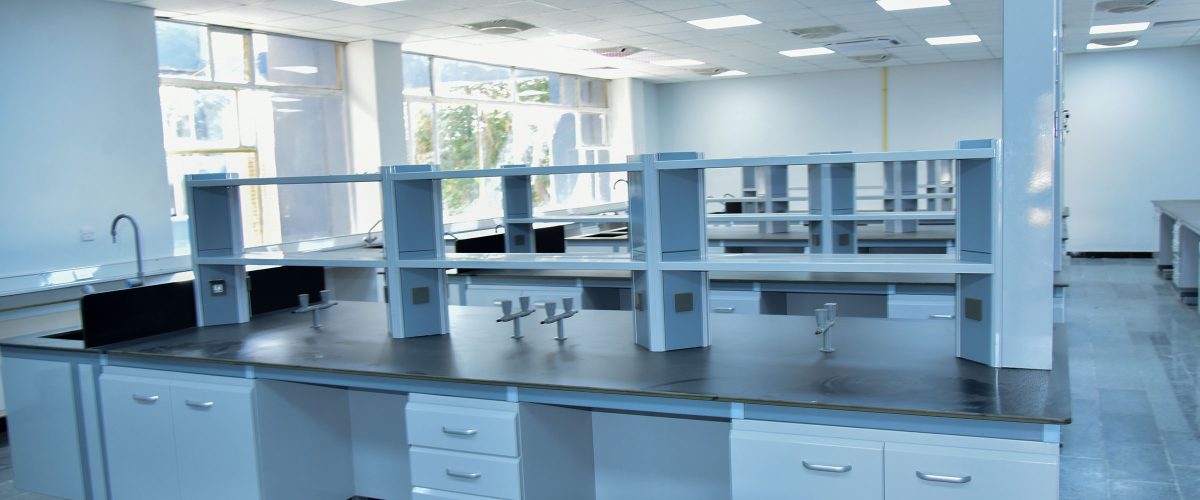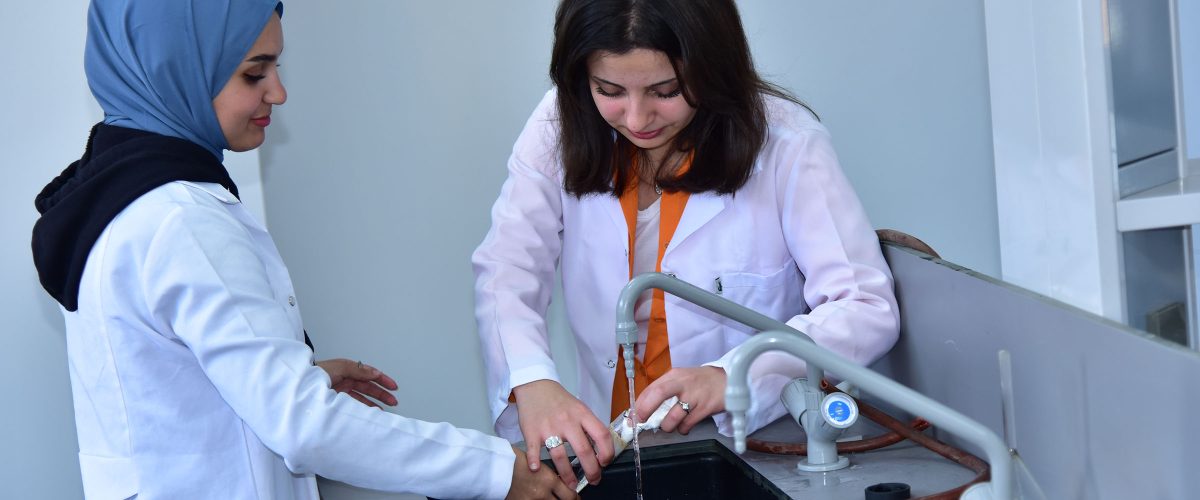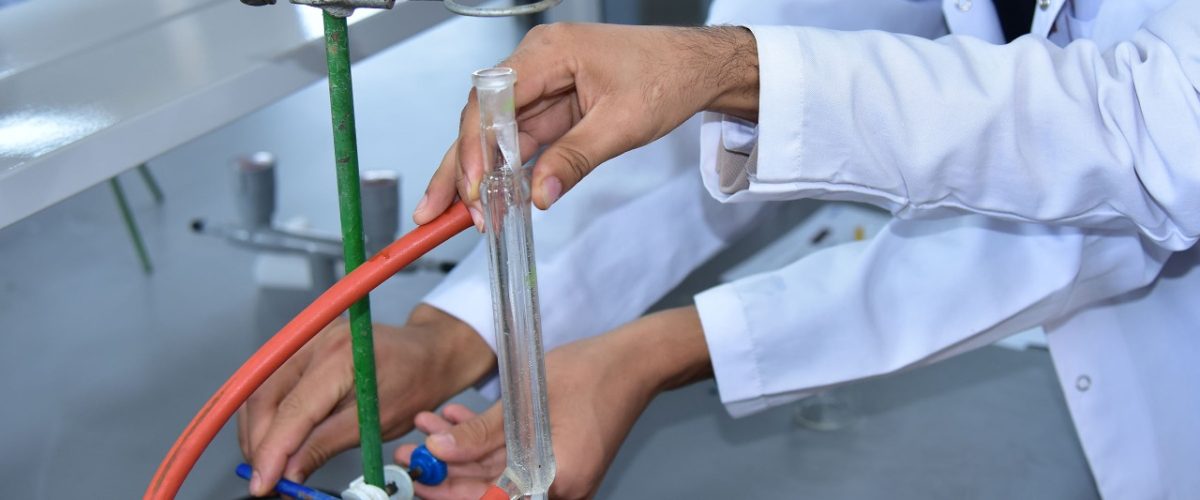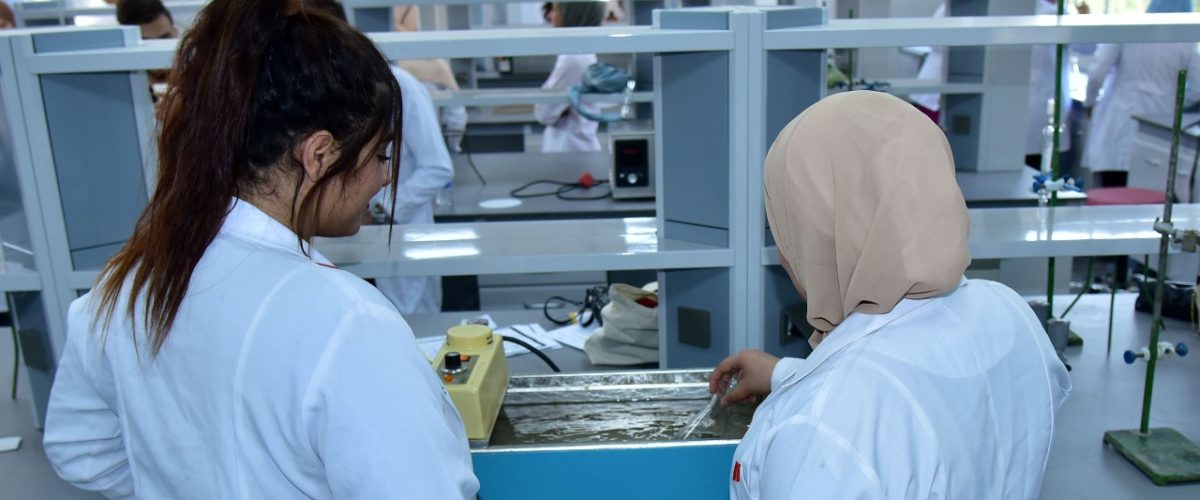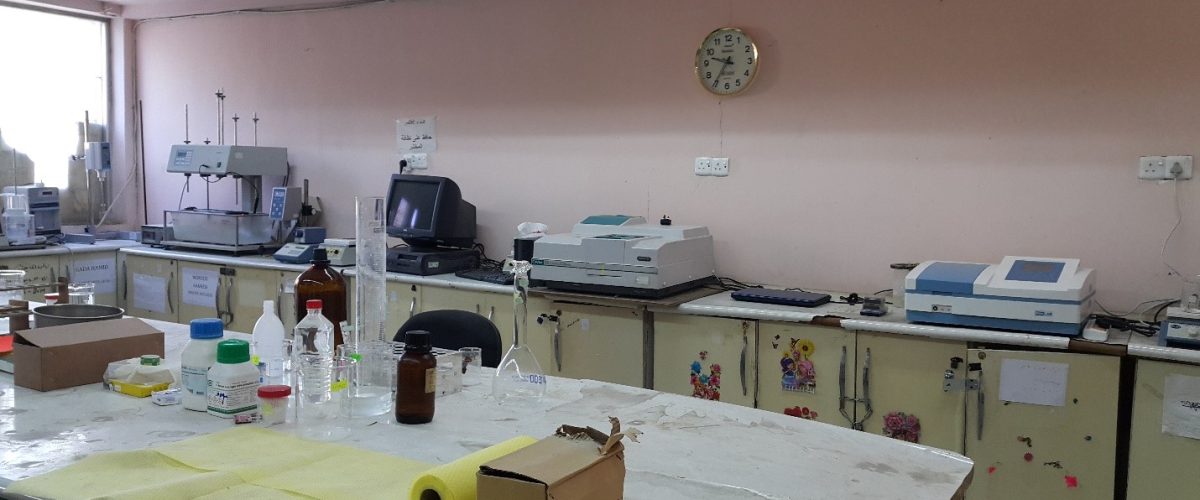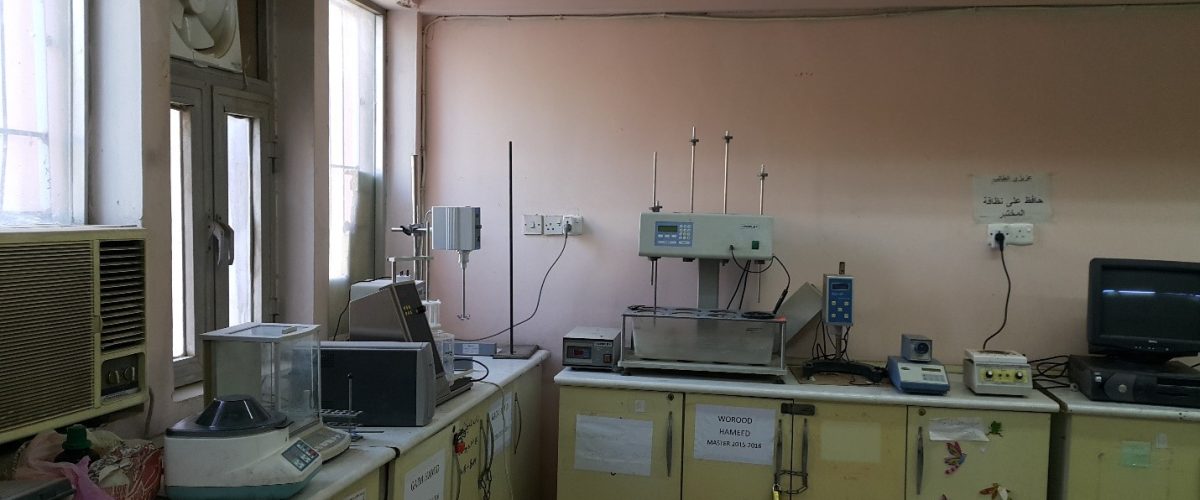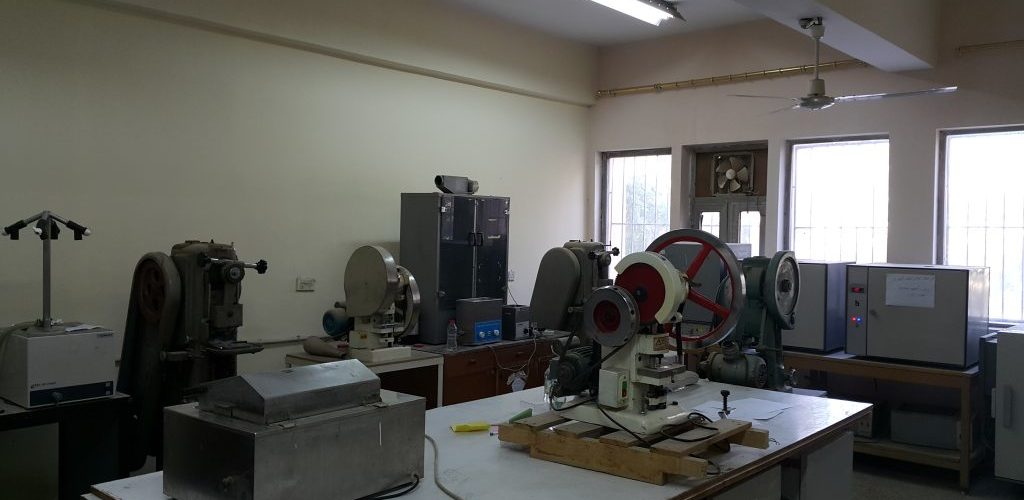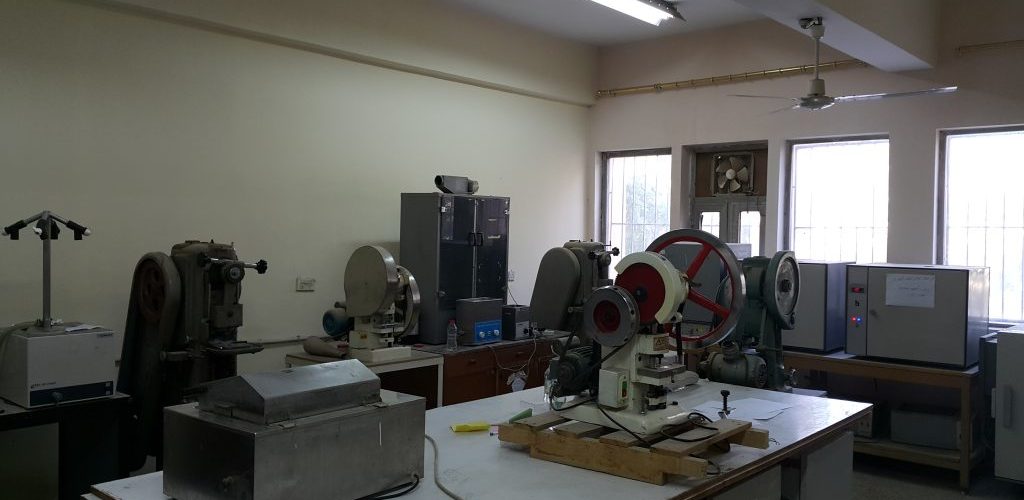Pharmaceutical Technology Laboratory
Overview: The Pharmaceutical Technology Laboratory was established to provide the necessary requirements for the practical teaching of pharmaceutical technology for third-year students in the undergraduate studies. This laboratory offers the essential materials, laboratory equipment, and infrastructure needed to conduct practical experiments related to this subject.
Objectives of the Pharmaceutical Technology Laboratory: The laboratory aims to train students in the preparation of pharmaceutical preparations at the community pharmacy level, including the following formulations:
- Emulsions Pharmaceutical Preparations: -These are formulations primarily composed of non-miscible oily substances with water. This is achieved by adding substances that aid in emulsification, using specific mixing techniques to prepare the final emulsion. The emulsion should exhibit an acceptable degree of stability to ensure the correct dosage for the patient.
- Suspensions Pharmaceutical Preparations: These include formulations with active ingredients that are insoluble in water. Techniques are employed to suspend these insoluble substances in the aqueous phase using surfactant substances that are active on the surface, thus aiding in suspending these insoluble materials in the aqueous phase.
- Other Liquid Pharmaceutical Preparations:This category encompasses liquid formulations such as simple solutions, syrups, elixirs, and spirits.
- Solid Pharmaceutical Preparations: these include solid formulations like powders, capsules, suppositories, as well as semi-solid formulations like creams and ointments. The laboratory’s objectives include providing students with hands-on experience in the preparation of these pharmaceutical formulations, ensuring they understand the principles and techniques involved in pharmaceutical technology. This practical training is crucial for students to develop the necessary skills for their future roles in the pharmaceutical field.
Pharmaceutical Calculations Laboratory
Overview :The Pharmaceutical Calculations Laboratory is one of the essential labs designed for conducting necessary experiments for the Pharmaceutical Calculations course practical for first-year students at the College of Pharmacy. The lab is equipped with the necessary infrastructure, including spacious work areas, suitable workbenches equipped with water and other required facilities, as well as fume hoods for the safe handling of chemical substances.
Objectives of the Pharmaceutical Calculations Laboratory:
- Introduction to Glassware and Basic Equipment: Familiarize students with glassware and basic equipment used in pharmaceutical preparations.
- Training on Volume Measurement and Pharmaceutical Calculations:
- Train students on how to measure volumes and perform pharmaceutical calculations necessary for preparing prescription formulations.
- Teach students how to scale up or down a prescription according to the patient’s needs and calculate the necessary proportions of the ingredients in the prescription.
- Techniques for Diluting Concentrated Solutions: Provide training on the techniques and methods used to properly and safely dilute concentrated solutions and dispense these solutions.
- Preparation of Aromatic Waters and Simple Solutions: Train students on the preparation of aromatic waters and simple solutions used in some common pharmaceutical preparations, commonly used in pharmacies for treating certain diseases and minor ailments.
- Skill Development for Precision in Pharmaceutical Preparations: Prepare students to be adept in pharmaceutical preparations, which require greater accuracy and skill in preparation for subsequent stages in the first year. The laboratory aims to provide students with practical skills in pharmaceutical calculations and preparations, ensuring they are well-prepared for the complexities of pharmaceutical work in subsequent stages of their academic journey.
pharmaceutical Physics and Biopharmaceutics Laboratory
Pharmaceutical Physics Laboratory Overview: The Pharmaceutical Physics Laboratory is one of the crucial laboratories in the Department of Pharmacology. It is equipped with suitable infrastructure, furnishings, and necessary apparatus to conduct practical experiments related to the field of pharmaceutical physics. This practical work is specifically designed for undergraduate students, particularly those in the second stage of their studies. The establishment of this laboratory aims to meet the requirements of the pharmaceutical physics course.
Objectives of the Pharmaceutical Physics Laboratory:
- Training Students in Conducting Experiments in Pharmaceutical Physics: The laboratory aims to train students in performing experiments related to pharmaceutical physics, focusing on the behavior of systems composed of two or three components but with different phases, depending on specific variables such as temperature and others.
- Training Students in the Preparation of Buffer Solutions: Students are trained on the preparation of buffer solutions, which are crucial in pharmaceutical preparations and analyses. Buffer solutions are stable at specific pH levels and aid in preparing stable pharmaceutical products with long shelf lives and suitable solubility.
- Introduction to Measurement Methods for Chemical Solubility: Students are introduced to methods for measuring the solubility of chemical substances, particularly drugs. This includes understanding the physicochemical properties of these substances and conducting experiments to increase their solubility using various techniques, such as the formation of soluble complexes and the use of surface-active agents.
- Training in Measuring Properties of Liquid Pharmaceutical Products: Students undergo training to measure properties such as viscosity, surface tension, and wetting of liquid pharmaceutical products. Understanding these properties is crucial for enhancing the stability of these liquids through modifications in these characteristics.
- Conducting Experiments to Measure Reaction Rates and Physical-Chemical Changes: The laboratory is utilized for conducting experiments to measure reaction rates and physical-chemical changes experienced by pharmaceutical products. This helps in predicting the long-term stability of these products. The overall objective of the Pharmaceutical Physics Laboratory is to provide students with practical experience in pharmaceutical physics, enabling them to apply theoretical knowledge to real-world scenarios and develop skills essential for their future roles in the pharmaceutical industry.
Overview of the Biopharmaceutics Laboratory:
The Biopharmaceutics Laboratory was established to provide the necessary requirements for conducting practical experiments in the Biopharmaceutics course for fourth-year students in the undergraduate studies. The lab is equipped with essential devices for these experiments, such as spectrophotometers and water baths needed to gradually raise the temperature of certain pharmaceutical preparations. Additionally, the lab is stocked with the necessary chemicals for conducting these experiments and tests.
Objectives of the Biopharmaceutics Laboratory:
- Calibration Curve Creation: Train students on how to create a calibration curve, crucial for measuring concentrations of unknown substances. This is done by measuring their absorption of light or using other methods, and utilizing mathematical equations associated with the curve.
2.Evaluation of Gastrointestinal Drugs: Instruct students on evaluating extracorporeal effects of laxatives and anti-acid formulations obtained in the stomach.
- Disintegration Tests: Train students on conducting disintegration tests for solid pharmaceutical formulations given orally, such as tablets and capsules. This test is of major importance in evaluating these formulations and predicting the extent of their absorption from the intestines to the bloodstream for their intended physiological effects.
- Drug Concentration-Time Profiles: – Instruct students on executing and drawing concentration-time profiles of drugs in blood or urine at various times after drug administration to the patient. Calculate the basic factors associated with drug kinetics within the body using different methods, thus determining the drug’s residence time in the body and designing the drug dosage and administration time based on these calculations.
- Preparation for Research Centers: Aim to prepare students to work in pharmaceutical research centers, particularly those focusing on bioavailability and bioequivalence. The laboratory focuses on providing students with practical skills in biopharmaceutics, enabling them to contribute effectively to pharmaceutical research, especially in the areas of availability and bioequivalence.
Industrial and Machinery Pharmacy Laboratory
Overview: The Industrial and Machinery Pharmacy Laboratory is considered one of the essential laboratories in the field of pharmaceutical sciences. Industrial pharmacy involves the design and production of pharmaceutical formulations that distinguish the final pharmaceutical product consumed by the patient. The laboratory is equipped with necessary machinery and devices for the production of these formulations, and it teaches the required quality control methods for fourth and fifth-year students in pharmacy colleges during their initial studies.
Objectives of the Laboratory:
- Training Students in Studying Material Properties: The laboratory aims to train students in studying the properties of materials that form the final pharmaceutical product before its final formulation.
2.Conducting Experiments on Powder Kinetics and Rheological Properties: Students perform experiments to measure the kinetic properties of powders and the rheological properties necessary to obtain powders with desirable characteristics. This is essential for producing consistent solid pharmaceuticals.
- Training on Granulation and Compression Techniques: Students are trained on methods for preparing and compressing granules, capsules, and the evaluation of these products based on recognized pharmacopeias such as the American and British Pharmacopeias.
- Training on Powder Granulation Methods: Students are trained on powder granulation methods for subsequent compaction into tablets or filling into capsules. This includes wet granulation and dry granulation techniques.
- Introduction to Encapsulation Techniques: Students are introduced to various encapsulation techniques for different purposes, such as sugar-coated capsules, capsules resistant to stomach acidity, and the design of sustained-release capsules to prolong the release of the active substance.
- Preparation of Pharmacists for Research and Pharmaceutical Industry: The laboratory aims to prepare pharmacists who can work in pharmaceutical research centers and pharmaceutical factories.
Postgraduate Studies Laboratory/ Department of Pharmaceutics
Overview: This laboratory, equipped with state-of-the-art devices for the preparation and evaluation of pharmaceutical formulations, serves as a fundamental laboratory for advanced pharmaceutical research in pharmacology. It aligns with global advancements in pharmaceutical sciences. The laboratory supports the scientific research conducted by postgraduate students in the Pharmacology Department at our college, as well as faculty members in the department.
Objectives of the Laboratory:
- Supporting Postgraduate Research: The laboratory aims to provide the necessary infrastructure for postgraduate students in the Pharmacology Department to conduct advanced pharmaceutical research for their diploma, master’s, and doctoral degrees.
- Facilitating Faculty Research: The laboratory is designed to meet the requirements of faculty members in the Pharmacology Department for their scientific promotion, consultancy research, and other important research in the field of pharmacology.
- Preparation of Highly Qualified Pharmacists: The laboratory aims to prepare highly qualified pharmacists holding advanced degrees who can take on important roles in pharmaceutical research centers, pharmaceutical factories, or academic institutions.


